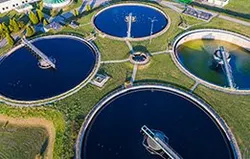
Potable water treatment 
This online course covers the principles of potable water treatment, including water quality parameters, treatment processes, and treatment plant design. Students will learn how to design and operate potable water treatment systems to achieve high-quality drinking water for human consumption. ▼
ADVERTISEMENT
Course Feature
![]() Cost:
Cost:
Free
![]() Provider:
Provider:
OpenLearn
![]() Certificate:
Certificate:
Free Certification
![]() Language:
Language:
English
![]() Start Date:
Start Date:
On-Demand
Course Overview
❗The content presented here is sourced directly from OpenLearn platform. For comprehensive course details, including enrollment information, simply click on the 'Go to class' link on our website.
Updated in [April 12th, 2023]
This course, Potable Water Treatment, provides an overview of the processes and techniques used to make water safe for human consumption. It covers topics such as the sources of water, the different types of water treatment, and the importance of water quality. Participants will gain an understanding of the principles of water treatment, including filtration, disinfection, and sedimentation. They will also learn about the different types of water treatment systems, including reverse osmosis, ultraviolet light, and chlorination. Finally, the course will discuss the importance of water quality monitoring and the regulations that govern water treatment. Upon completion of this course, participants will have a better understanding of the processes and techniques used to make water safe for human consumption.
[Applications]
After completing this course, learners can apply their knowledge of potable water treatment to their everyday lives. They can use their understanding of the processes involved to make informed decisions about the water they consume. They can also use their knowledge to help others understand the importance of potable water treatment and the steps necessary to ensure safe drinking water. Additionally, learners can use their newfound knowledge to help inform policy decisions related to water treatment and access.
[Career Paths]
1. Water Treatment Plant Operator: Water treatment plant operators are responsible for the operation and maintenance of water treatment plants. They monitor and adjust the plant’s equipment and processes to ensure that the water meets safety and quality standards. This job is expected to grow by 8% over the next decade.
2. Water Quality Analyst: Water quality analysts are responsible for testing and analyzing water samples to ensure that they meet safety and quality standards. They use a variety of laboratory equipment and techniques to analyze the samples and report their findings. This job is expected to grow by 6% over the next decade.
3. Water Treatment Engineer: Water treatment engineers are responsible for designing, constructing, and maintaining water treatment systems. They use their knowledge of engineering principles and water treatment processes to develop efficient and cost-effective solutions. This job is expected to grow by 9% over the next decade.
4. Water Conservation Specialist: Water conservation specialists are responsible for developing and implementing strategies to reduce water consumption and waste. They work with businesses, governments, and communities to identify and implement water conservation measures. This job is expected to grow by 11% over the next decade.
[Education Paths]
1. Environmental Engineering: Environmental engineering is a field of study that focuses on the protection and management of the environment. It involves the development of systems and processes to reduce pollution, conserve natural resources, and protect human health. This degree path is becoming increasingly important as the world faces the challenges of climate change, population growth, and resource scarcity.
2. Civil Engineering: Civil engineering is a field of study that focuses on the design, construction, and maintenance of infrastructure such as roads, bridges, dams, and buildings. This degree path is becoming increasingly important as the world faces the challenges of urbanization, population growth, and resource scarcity.
3. Chemical Engineering: Chemical engineering is a field of study that focuses on the design, development, and optimization of chemical processes. This degree path is becoming increasingly important as the world faces the challenges of energy production, resource scarcity, and environmental protection.
4. Water Resources Engineering: Water resources engineering is a field of study that focuses on the management and protection of water resources. This degree path is becoming increasingly important as the world faces the challenges of climate change, population growth, and resource scarcity.
Course Provider

Provider OpenLearn's Stats at AZClass
They will help learners understand the importance of drinking water and the need for proper disposal. It will outline the drinking water treatment process, from raw water collection to final product. Learners will understand the importance of potable water and the need for proper treatment to ensure its safe consumption for humans. This course will provide learners with the skills needed to operate and maintain drinking water treatment systems. It will cover topics such as the operation of pumps, valves and other equipment as well as the maintenance of the system. Learners will acquire the skills needed to operate and maintain drinking water treatment systems and ensure end product safety.
Discussion and Reviews
0.0 (Based on 0 reviews)
Explore Similar Online Courses

How To Convert ChatGPT Into Super Power Human Robot?

Digital Lettering: Designing 3D Type and Texture

Python for Informatics: Exploring Information

Social Network Analysis

Introduction to Systematic Review and Meta-Analysis

The Analytics Edge

DCO042 - Python For Informatics

Causal Diagrams: Draw Your Assumptions Before Your Conclusions

Whole genome sequencing of bacterial genomes - tools and applications

Educating for Sustainable Development (ESD) in Schools and Universities

Environmental Engineering: Drinking Water Treatment

Biological process design for wastewater treatment
 Related Categories
Related Categories
 Popular Providers
Popular Providers
Quiz
 Submitted Sucessfully
Submitted Sucessfully
1. What is the main purpose of potable water treatment?
2. What is the most common method of potable water treatment?
3. What is the most important step in potable water treatment?


Start your review of Potable water treatment